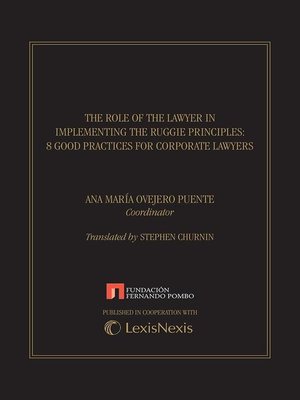The Role of the Lawyer in Implementing the Ruggie Principles
ebook ∣ 8 Good Practices For Corporate Lawyers
By Ana Ovejero

Sign up to save your library
With an OverDrive account, you can save your favorite libraries for at-a-glance information about availability. Find out more about OverDrive accounts.
Find this title in Libby, the library reading app by OverDrive.



Search for a digital library with this title
Title found at these libraries:
| Library Name | Distance |
|---|---|
| Loading... |
The role for business lawyers is changing and evolving towards a new professional paradigm. It is a new age for the conception of legal assistance and legal consulting activities in the XXI century: a new concept for legal services and clients representation, that integrates well-known criteria as "due diligence interpreted from a different perspective".
The new "compliance duties" for companies are transforming step by step how to conduct business. The ethics in business theories are key instruments in this transformation and United Nations' initiatives, as the Business and Human Rights movement, have boosted it. The lawyer of the future should assume its ethical and professional duties, accordingly with its social responsibilities and social leadership. Consequently, internal codes of conduct and deontological rules redefine the professional obligations and entail a new commitment of public service to which all lawyers are called to professionally. It means a different definition for the legal profession itself: the lawyer as an actor and servant of justice, of the Rule of Law, and human rights.
The United Nations Guiding Principles—and the obligations of respect assumed by companies—acquire an enormous relevance, because they determine the basis for a new healthy client-lawyer relationship, based on its compliance with the Ruggie framework for business. The UN's Ruggie Principles impact the definition of these ethical obligations by defining how the lawyer should be with the client. The UN Guiding Principles should be read in a manner compatible with the ethical obligations of the legal profession, and in the same way, professional ethical codes should be reinterpreted in the light of the fundamental role played by lawyers in defending the Rule of Law and the respect of human rights.
The conclusion is that the fundamental role of lawyers is the pursuit of the Rule of Law, which undoubtedly involves their proactive action in the defense and respect of human rights when exercising their profession as business lawyers. It complements the traditional and exclusive interpretation of the social function of the lawyer as a servant of justice, and encourages the assumption of their leadership in the transformation of ethically responsible businesses.
"The Role of the Lawyer in Implementing the Ruggie Principles: 8 Good Practices For Corporate Lawyers" focuses on this implementation of the UN's Guiding Principles on Business and Human Rights and provides detail for business lawyers to gain an understanding of these Principles and what they require for their clients and also with respect to their own conduct.







